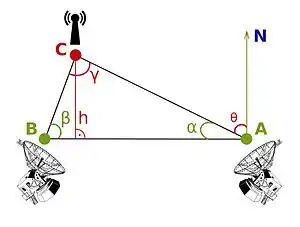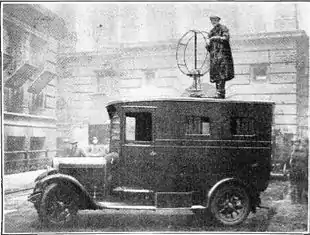Radiodetermination
As defined by FS-1037C and ITU Radio Regulations, radiodetermination[1] is "the determination of the position, velocity or other characteristics of an object, or the obtaining of information relating to these parameters, by means of the propagation properties of radio waves."
There are two main fields to radiodetermination:[1]
- radionavigation: "used for the purposes of navigation, including obstruction warning", which is mainly active;
- radiolocation: "used for purposes other than those of radionavigation", which is mainly passive.
Examples
 Triangulation using radiodetermination
Triangulation using radiodetermination British Post Office mobile RDF, 1927
British Post Office mobile RDF, 1927 Direction-finding system Galeta Island
Direction-finding system Galeta Island Direction finder with direction-finding aerial
Direction finder with direction-finding aerial
International regulation

Radiodetermination service is – according to Article 1.40 of the International Telecommunication Union's (ITU) Radio Regulations (RR)[2] – defined as «A radiocommunication service for the purpose of radiodetermination.»
Classification
This radiocommunication service is classified in accordance with ITU Radio Regulations (article 1) as follows:
Radiodetermination service (article 1.40)
- Radiodetermination-satellite service' (article 1.41)
- Radionavigation service (article 1.42)
- Radionavigation-satellite service (article 1.43)
- Maritime radionavigation service (article 1.444)
- Maritime radionavigation-satellite service (article 1.45)
- Aeronautical radionavigation service (article 1.46)
- Aeronautical radionavigation-satellite service (article 1.47)
- Radiolocation service (article 1.48)
- Radiolocation-satellite service (article 1.49)
![]() This article incorporates public domain material from the General Services Administration document: "Federal Standard 1037C".
This article incorporates public domain material from the General Services Administration document: "Federal Standard 1037C".
See also
References
- ITU Radio Regulations, Section IV. Radio Stations and Systems – Article 1.9, definition: radiodetermination
- ITU Radio Regulations, Section IV. Radio Stations and Systems – Article 1.40, definition: radiodetermination service
Further reading
- "Chapter 4: Radiodetermination and Radiodetermination-Satellite Services". US Spectrum Requirements: Projections and Trends. 1993-12-31. Retrieved 2020-09-01.